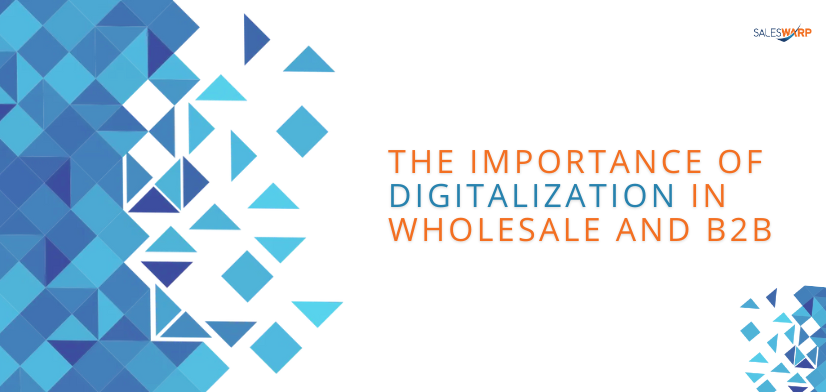The Importance of Digitalization in B2B

Embrace digitalization and streamline your B2B operations with SalesWarp’s comprehensive solutions.
The shift towards digitalization has become a cornerstone for success. As industries evolve, the integration of digital strategies has allowed brands to connect with customers and stay ahead of the curve. While many D2C brands have embraced digitalization, wholesale, and B2B have often been overlooked. Digitalization can have a huge impact on the efficiency of operations.
Bridging the Complexity Gap:
Historically, B2B transactions have been complex, involving intricate processes in larger volumes. Digitalization serves as a bridge, seamlessly connecting the components of the supply chain. Unlike traditional methods, where manual processes can lead to errors and delays, modern technology ensures seamless communication and collaboration between businesses.
Streamlining EDI for Effortless Transactions:
EDI complexities often plague B2B operations, leading to manual data entry errors and order-to-cash cycle delays. EDI streamlines the exchange of documents such as purchase orders, invoices, and shipping notices, eliminating manual data entry, reducing errors, and accelerating the order-to-cash cycle.
Seamless B2B Workflows:
Digitalization empowers businesses to create robust B2B workflows tailored to their specific needs. From order placement to fulfillment and invoicing, a well-designed digital workflow ensures a smooth and transparent process. This not only enhances operational efficiency but also fosters better relationships between wholesalers and their B2B customers.
Custom Order Entry:
One of the significant advantages of digitalization in B2B operations is the ability to facilitate custom order entry. Businesses can implement solutions that allow clients to place orders with unique specifications, ensuring a personalized and tailored experience. This flexibility meets customer demands more effectively.
Streamlining Approval Processes:
Approval processes in B2B transactions often involve multiple stakeholders and delays. Digitalization provides the tools to streamline these approval processes, reducing the time it takes to get the necessary authorizations. Automated approval workflows ensure that orders move through the system swiftly, avoiding bottlenecks and enhancing overall efficiency.
Navigating Pricing Dynamics with Price Books:
Maintaining accurate and up-to-date pricing information is critical in B2B transactions. Digitalization allows for the creation and management of dynamic price books, ensuring that clients have access to the latest pricing information. This transparency builds trust and helps businesses stay competitive in a dynamic market.
As businesses embrace digitalization, addressing these challenges will be crucial for sustained success. SalesWarp streamlines the transition to digital, offering a comprehensive solution that simplifies and enhances, minimizing the common issues associated with wholesale and B2B. Schedule a free demo and learn how SalesWarp can help you make the transition.
